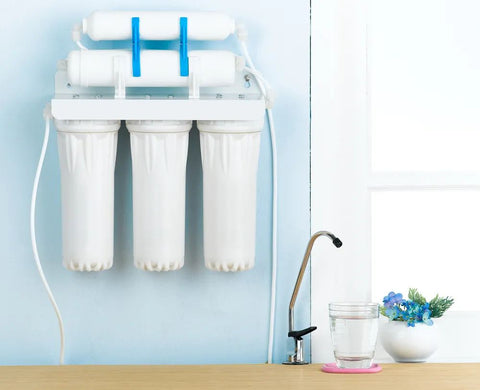Are you confusing about which kind of water filter to choose between Reverse Osmosis and Ultrafication water filter? They both are efficient in some specific situation, they have different structures, which form the different features of them. This article will show you everything of it.
What is a Reverse osmosis water purifier?
The core filter membrane used in RO system is the reverse osmosis membrane, the filtration precision of the RO membrane is 0.0001 micron. RO membrane can ensure that the quality of the effluent is always safe and reliable, only water molecules and the minerals that is smaller than it can pass through the membrane, and all of them will be retained to drink.
While for particles as bacteria, viruses, scale, and pollutants, they cannot pass through the membrane, after coalescing they will be discharged. Just as our digestion system, people drink water to have urine excreted, useful nutrition gets absorption, and harms get removal, RO water purifier works as the same way, this is the biggest feature of the water purifier. If you only want to solve the pollution issues of water for drinking and cooking, the RO membrane water filter is good choice.
What is Ultrafiltration Water Purifier?
The core filtration membrane used is an ultrafiltration membrane or UF membrane for short. The filtration precision is 0,01 microns. And with its 0.001μm membrane pores, the ultrafiltration water purifier can effectively remove impurities, such as rust, some bacteria, viruses, colloids, etc. It is commonly applied for tap, because it makes up some issues for some simple and rough single-stage water purifiers can’t do, as well as bacteria breeding secondary pollution for activated carbon water purifier bacteria.
Three Differences Between Reverse Osmosis And Ultrafitration Water Filter
Based on the difference of structure, they both have their unique features, there are mainly three differences, as the following table:
|
Items |
RO Water Filter |
Ultra Water Filter |
|
Structure Feature |
0.0001 micron |
0,01 microns |
|
Pressure requirement |
need a booster pump |
work normally without electricity |
|
Wastewater Amount |
Depend on the techs |
None |
|
Flow Rate |
1.3 L/min |
1.5 L/min |
- Pressure Requirement
Normally the reverse osmosis water purifier uses electricity, it needs to be plugged in to ensure normal operation. Because RO reverse osmosis water purifiers need a booster pump to work properly, but don't worry, the booster pump only works when the water purifier is working, and the power cost is lower.

On the opposite, the ultrafiltration water purifier can work normally without electricity. Ultrafiltration water purifiers are physical types of filtration. They can filter water without pressure, even in areas where the water pressure is up to standard they can work well too. In addition, for some ultrafiltration water purifiers with single-cartridge filters, which are in a low requirement in terms of space occupation and installation conditions.
- Waste Water Generation
The reverse osmosis water purifier will generate wastewater in the purification process because of the RO membrane. Different technical levels produce different rates of wastewater. The more waste water it generates, the lower purifying rate it has. Therefore, when choosing a reverse osmosis water purifier, it is best to choose a product with less wastewater, which can save water.

Ultrafiltration water purifiers do not produce waste water during the purification process, so some industries are more inclined to choose ultrafiltration water purifiers.
- Flow Rate
The flow rate of Reverse Osmosis depends on its structure, the finer of the filtration structure brings greater water flow. On another side, the larger the water flow through the RO membrane, the higher value of the water production. For example, the general water output of a 500G RO machine is 1.3 liters/minute. Ultrafiltration water purifiers do not need to worry about the flow rate. Their water output is typically 1.5 liters per minute. If the water consumption is high, the water flow should be optimistic.
Conclusion
As above, you already know the differences between ultrafiltration water purifiers and reverse osmosis water purifiers, so when purchasing, you’d better make choices according to your own needs. For families, if the aim is only for cooking, so the selection of ultrafiltration can be satisfied, if the need is for drinking water, it is best to choose a reverse osmosis water purifier.
There are many choices in the marketing, while I recommend you Membrane Solutions, who only produces the water filters in high quality and work efficiency, and products are versatile here, such as water filter pitchers, RO water filter system, and some other kinds of water filtration system. If you are in need of water filtration, don’t look further, it can be your best option.


